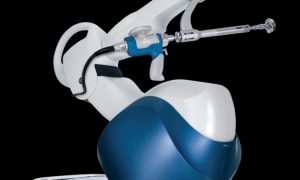 Robotic surgery does not eliminate the need for human surgeons, but some feel that it does make the humans better surgeons. The robot can help to eliminate human errors in surgery, making delicate procedures more precise.
Robotic surgery does not eliminate the need for human surgeons, but some feel that it does make the humans better surgeons. The robot can help to eliminate human errors in surgery, making delicate procedures more precise.
There is great debate about how much robotic surgery helps when compared to traditional surgery, but there is no questions that many doctors and patients want this technology available.
Robots Used in Orthopedics
Robots can perform, or help perform, a variety of tasks during surgery. In orthopedics, most robotic applications have focused on joint replacement surgery.
The primary goal during surgery to replace a joint is to properly position the prosthetic joint with a perfect fit, proper alignment, with restoration of joint function.
In fact, the longevity and function of joint replacements has been shown to be related to how well the surgery is performed. It cannot be understated how important this factor is in determining the success of joint replacement. I often hear patients focusing on variables such as the type or brand of implant, when in actually, the most important variable is probably how well the implant is placed in the body. A great implant will not overcome poor surgical technique. Robots can help to control the insertion of joint replacements in the body.
In hip and knee replacement, robots have been used to help guide appropriate bone cuts to accommodate the implanted joint. Robots can also be used to help navigate the anatomy to ensure proper alignmentof an implanted joint.
Success of Robotic Surgery
There have been studies to investigate the success of robotic surgery.
Most of the research is sponsored by the companies investigating the new technology, so there are questions about the quality of some of these studies.
The general theme of the research has shown that robotic surgery may help improve the consistency with which surgeons implant joint replacements. However, there is no research that clearly demonstrates an improvement in how long joint replacements last or how well they function. Most advocates of robotic applications in orthopedic surgery are basing their recommendations on theoretical benefits rather than on actual data.
Problems With Robots
As stated, robotic surgery is a rapidly growing area of surgery, but there is much left to be learned. Robotic surgery is very expensive, and with little demonstrated benefit, many question if this is an appropriate expense.
I use the robot for selected patients including partial knee replacements, and patients who have a deformity requiring a hip replacement.
